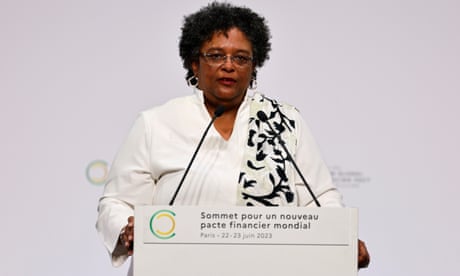As summit delegates gather in Nairobi next week, those from the global north should remember one thing: inaction will cost them more in the end than an immediate concerted effort
Graça Machel

Wed 30 Aug 2023
Wherever you are in the world, this summer has shown beyond doubt that the climate crisis is manifesting with ever more extreme effects. Soaring temperatures and wildfires across Europe and North America should make it clear to politicians, voters and investors that this crisis affects not just the “developing world” but is a common threat that demands a common response.
For those of us in Africa, there is temptation to ask: “What took you so long?” We have been experiencing the impact of climate-related droughts, storms, cyclones, flooding and heat for decades now, and have had to show resilience and innovation in our efforts at adaptation.
The real mark of success will be when countries across the global north and south work together in a spirit of mutual recognition and respect to finally meet the commitments jointly made under the Paris agreement back in 2015.

Wed 30 Aug 2023
Wherever you are in the world, this summer has shown beyond doubt that the climate crisis is manifesting with ever more extreme effects. Soaring temperatures and wildfires across Europe and North America should make it clear to politicians, voters and investors that this crisis affects not just the “developing world” but is a common threat that demands a common response.
For those of us in Africa, there is temptation to ask: “What took you so long?” We have been experiencing the impact of climate-related droughts, storms, cyclones, flooding and heat for decades now, and have had to show resilience and innovation in our efforts at adaptation.
The real mark of success will be when countries across the global north and south work together in a spirit of mutual recognition and respect to finally meet the commitments jointly made under the Paris agreement back in 2015.
The Africa climate summit, taking place next week in Nairobi, Kenya affords a major opportunity to push links between clean energy and development across the continent, and to mobilise support for international investment in Africa. Investment not out of charity but because the continent offers a wealth of climate-related growth opportunities: a failure to invest in Africa’s potential will be detrimental for the whole world.
The seismic events of the past three years, from Covid to Russia’s war on Ukraine, have underscored how interconnected our economies remain, and how vulnerable supply chains, energy and food markets can be when exposed to external shocks.
This is why it is in the collective global interest to ensure that Africa has the financial means and investment to adapt to the realities of a changing climate and make the transition from fossil fuel-based economies to a net zero, renewables-centric model.
Adaptation investments are essential to keep the global economy afloat. If rich nations fail to invest in poorer countries, this will impact growth and supply chains, stability and security; in a globalised economy, no one escapes when extreme weather hits.
To phase out fossil fuels and protect against climate disasters, developing countries now need trillions, not billions
Sadly, we know that appeals to altruism are insufficient. Back in 2009, rich countries solemnly promised to work towards giving $100bn a year in climate finance to developing economies, but this pledge has never been met in full and most probably never will. It is also clear that this pledge is now nowhere near what is required. To phase out fossil fuels and protect their citizens from worsening climate disasters, developing countries will need trillions rather than billions of dollars.
African leaders and activists need to come to the Nairobi summit armed with sound strategies and compelling arguments that it is in wealthy countries’ own economic interests to work together to strengthen Africa’s adaptation capacity.
Africa needs an estimated $579.2bn (£460bn) in adaptation finance over the period 2020–2030, but current adaptation flows to the continent are five to 10 times below those estimated needs. We need to invert the discourse and make the case that the costs of inaction are far higher, and with far fewer returns, than the costs of investment.
According to the Intergovernmental Panel on Climate Change, with no improvements to vulnerability or adaptation, high emissions could see sub-Saharan Africa lose 12% of GDP by 2050 and 80% by 2100.
There remains a fundamental disconnect between domestic agendas designed to stimulate investment in renewable energies and meet climate targets and the external-focused trade and investment policies pursued by Washington, Brussels and other capitals in so-called developed nations, which prioritise short-term returns and protectionist practices.

World Bank offers developing countries debt pauses if hit by climate crisis
There can be no “global green growth” agenda without strong and sustained support for climate adaptation in Africa. This must include at least 50% of climate finance going to adaptation, with all rich countries meeting their Cop26 commitment to double climate adaptation finance by 2025.
It should also mean a definitive move away from fossil fuels. As my fellow Elder Mary Robinson says: “We must stop spending money on what is harming us.”
The summit in Nairobi needs to demonstrate that climate adaptation investment in Africa is in all our interests. This must be a moment of profound solidarity, meaningful action and shared commitment to a cleaner, greener and more just and prosperous world for all.
Graça Machel is co-founder and deputy chair of the Elders and established the pan-African Graça Machel Trust in 2010. A Mozambican politician and humanitarian, she served as first spouse of South Africa when her late husband Nelson Mandela was president
The seismic events of the past three years, from Covid to Russia’s war on Ukraine, have underscored how interconnected our economies remain, and how vulnerable supply chains, energy and food markets can be when exposed to external shocks.
This is why it is in the collective global interest to ensure that Africa has the financial means and investment to adapt to the realities of a changing climate and make the transition from fossil fuel-based economies to a net zero, renewables-centric model.
Adaptation investments are essential to keep the global economy afloat. If rich nations fail to invest in poorer countries, this will impact growth and supply chains, stability and security; in a globalised economy, no one escapes when extreme weather hits.
To phase out fossil fuels and protect against climate disasters, developing countries now need trillions, not billions
Sadly, we know that appeals to altruism are insufficient. Back in 2009, rich countries solemnly promised to work towards giving $100bn a year in climate finance to developing economies, but this pledge has never been met in full and most probably never will. It is also clear that this pledge is now nowhere near what is required. To phase out fossil fuels and protect their citizens from worsening climate disasters, developing countries will need trillions rather than billions of dollars.
African leaders and activists need to come to the Nairobi summit armed with sound strategies and compelling arguments that it is in wealthy countries’ own economic interests to work together to strengthen Africa’s adaptation capacity.
Africa needs an estimated $579.2bn (£460bn) in adaptation finance over the period 2020–2030, but current adaptation flows to the continent are five to 10 times below those estimated needs. We need to invert the discourse and make the case that the costs of inaction are far higher, and with far fewer returns, than the costs of investment.
According to the Intergovernmental Panel on Climate Change, with no improvements to vulnerability or adaptation, high emissions could see sub-Saharan Africa lose 12% of GDP by 2050 and 80% by 2100.
There remains a fundamental disconnect between domestic agendas designed to stimulate investment in renewable energies and meet climate targets and the external-focused trade and investment policies pursued by Washington, Brussels and other capitals in so-called developed nations, which prioritise short-term returns and protectionist practices.

World Bank offers developing countries debt pauses if hit by climate crisis
There can be no “global green growth” agenda without strong and sustained support for climate adaptation in Africa. This must include at least 50% of climate finance going to adaptation, with all rich countries meeting their Cop26 commitment to double climate adaptation finance by 2025.
It should also mean a definitive move away from fossil fuels. As my fellow Elder Mary Robinson says: “We must stop spending money on what is harming us.”
The summit in Nairobi needs to demonstrate that climate adaptation investment in Africa is in all our interests. This must be a moment of profound solidarity, meaningful action and shared commitment to a cleaner, greener and more just and prosperous world for all.
Graça Machel is co-founder and deputy chair of the Elders and established the pan-African Graça Machel Trust in 2010. A Mozambican politician and humanitarian, she served as first spouse of South Africa when her late husband Nelson Mandela was president

No comments:
Post a Comment